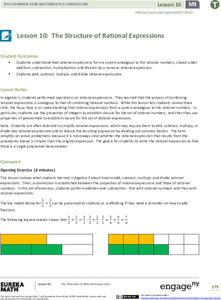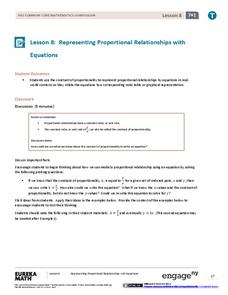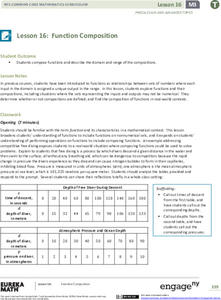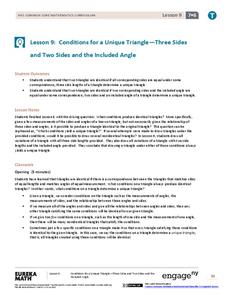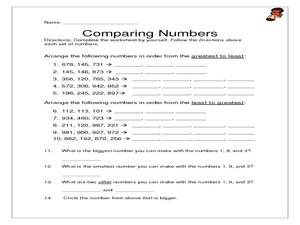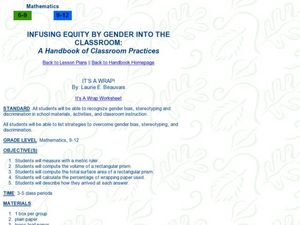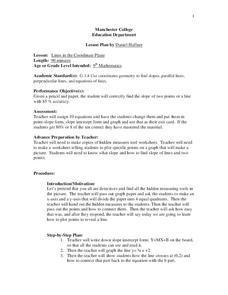EngageNY
The Structure of Rational Expressions
Find out when rational expressions are closed. Pupils review adding, subtracting, multiplying, and dividing with rational numbers to make the connections to operations with rational expressions. Using specific examples, learners notice...
EngageNY
Composite Area Problems
The 21st segment in a 28-part series provides learners with area problems involving composite figures. To find the solution, pupils must decide whether to add or subtract areas. The composite figures are composed of quadrilaterals,...
EngageNY
Representing Proportional Relationships with Equations
Use the constant of proportionality to relate the independent variable to the dependent variable. The eighth installment of a 22-part series instructs pupils to use the equation to find the constant of proportionality and then write the...
EngageNY
Converting Between Fractions and Decimals Using Equivalent Fractions
Use powers of 10 to convert between fractions and decimals. Pupils convert decimals to fractions by using place values in the 13th installment of a 25-part series. Class members reverse the process and find equivalent fractions with a...
EngageNY
Complementary and Supplementary Angles
Connect algebraic and geometric concepts to solve problems. The first instructional activity in the 29-part series examines complementary and supplementary angle relationships. Scholars write equations to represent the relationships and...
EngageNY
Function Composition
Combine functions for the first time. Pupils investigate composition of functions using a function table and then function machines in the 17th installment in a 23-part Precalculus series. Scholars learn the two notations for composition...
EngageNY
Conditions for a Unique Triangle—Three Sides and Two Sides and the Included Angle
Building on the previous activity in the 29-part series, the ninth activity asks individuals to construct a triangle given specific criteria. First, they are given three specific side lengths, followed by two sides and the included...
EngageNY
Unit Rate as the Constant of Proportionality
What do unit rates and constants of proportionality have in common? The lesson plan addresses this question and introduces the concept of constant proportionality to the class. Individuals find that the unit rate and the constant of...
Curated OER
Math in Your Life
Examine how math fits into everyday lives by writing mathematical word problems and answering them. Middle schoolers will also practice their test taking skills utilizing different kinds of tests.
Curated OER
Arranging Numbers in order up to 1,000
Third graders arrange numbers up to 1,000. In this arranging numbers instructional activity, 3rd graders play a game to try and build the biggest number they can using number tiles. Students work in groups to draw number tiles from...
Curated OER
Mathematical Balloon Pop
First graders study addition and subtraction. In this mathematics and physical education lesson plan, 1st graders pop balloons and solve math sentences involving addition and subtraction inside each balloon.
Pennsylvania Department of Education
Using the Coordinate Plane in Problem Solving
Fifth graders practice solving problems. In this fraction and decimal lesson plan, 5th graders recognize the relationship between fraction and decimals. Students estimate problem results and write expressions to use for...
Curated OER
Data Analysis, Probability, and Discrete Mathematics
Fourth graders analyze the data in a bar graph, pictograph, line graph, and a chart/table and draw conclusions based on the data. They discuss each type of graph, write questions for each graph, and analyze the data as a class.
Curated OER
Triangles in My Life
Tenth graders investigate where in the real world triangles are used. In this geometry lesson plan, 10th graders write an essay describing where in their lives triangles are used. They can use food, buildings, clothing or anything...
Curated OER
Applying Proportionality in Scale Drawings
Sixth graders examine a blue print and discuss the reasoning behind using blue prints. In this proportionality lesson, students collaborate with their teammates to create a scale drawing. Once that is complete, 6th graders write a...
Curated OER
Species Diversity in Ecosystems with Different Techniques of Land Management
Students visit numerous places to help in their understanding of Ecology. In this biology lesson plan, students will learn about characteristics and how to identify numerous plants and animals. This lesson allows for many field trip...
Curated OER
Infusing Equity in the Classroom by Gender
Students investigate the idea of gender descrimination in the classroom. In this algebra lesson plan, students collect data in stereotyping, and gender bias in the classroom, school materials and activities. They graph and analyze their...
Curated OER
History in the Making: The Tortilla
Fourth graders examine the history of the tortilla and extend the study across the curriculum. In this history of the tortilla lesson plan, 4th graders research the background of the tortilla, determine the ingredients, and work with the...
Curated OER
Lines in the Coordinate Plane
Students graph lines in a coordinate plane. In this geometry lesson, students graph lines on a coordinate plane, and identify the slope. They classify the lines as parallel or perpendicular and write an equation of a given line.
Curated OER
"Zero-ing" In On Integers
Students add and subtract integers. In this integer instructional activity, students use models to demonstrte the addition and subtraction of integers. They describe zero pairs and write steps to add and subtract integers.
Curated OER
Energy Motion in the Ocean
Students explore the wave energy that is generated and transferred in the ocean. Through the use video and the Internet, students explore the aspects of a wave and how its energy affects the ecology of the seashore.
Curated OER
The Warrior Role in Greek Society
Students are introduced to the various gods and goddesses in ancient Greek mythology. In groups, they use print and electronic resources to research the ways Greek culture has influenced the modern world. To end the lesson, they...
Curated OER
The Exchange, Destruction and Reconstruction of Architectural Signs and Symbols in Mexico-Tenochtitlan: A History of Order and Power
Fifth graders use the internet to research the history of cultures throughout the world. In groups, they disucss the meaning of various symbols and view Tenochtitlan as a center of power and wealth. They use everyday materials to...
Curated OER
Stiochiometry: Quantifying Changes in the Environment
Students examine stoichiometry. In this chemical reaction and mole lesson, students complete an experiment based on readiness levels to explore that changes are quantified in chemical reactions.
